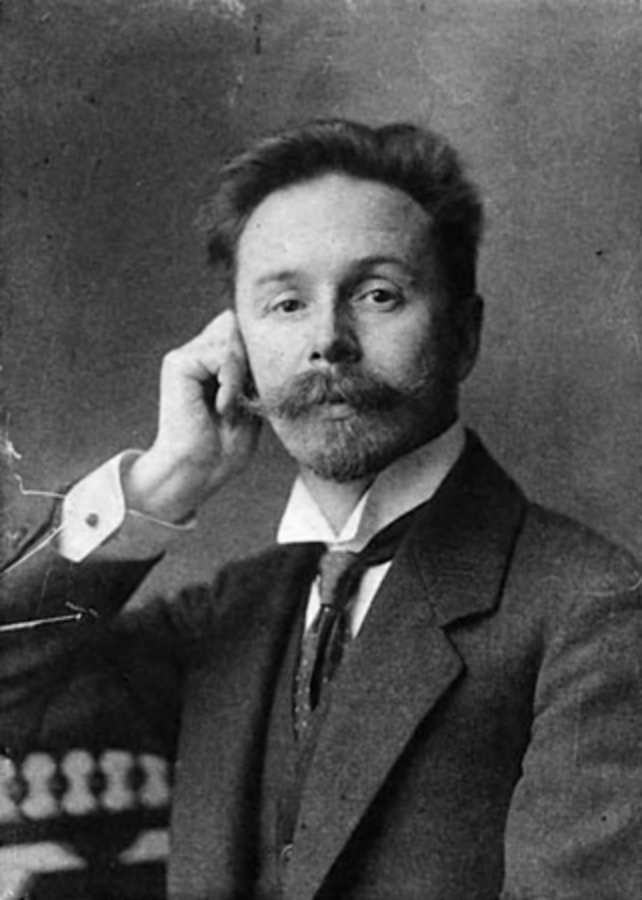SKRIABINE
For real, Russian music is the most varied there is; it has everything, from the sensitive and touching sentimentality (Tchaikovsky), to the sentimentality that risks tipping into vulgarity (Rachmaninoff), to the primitive savagery turned modernity (Stravinsky), to the industrial savagery turned primitive (Mossolov), to solar joviality (Prokofiev), to exacerbated drama (Shostakovich), to aristocratic and diaphanous refinement, and to the declared and incandescent mysticism (Scriabin for both).
Scriabin, who died bizarrely after scratching a small pimple above his lip, on the day his lease expired. Scriabin, who had synesthesia (the involuntary ability to associate a sound with a specific color), like Olivier Messiaen, who died on the same day, 77 years later.
Even though he has emerged more and more in recent years, Scriabin long remained in the shadow of his contemporaries. Together with Berlioz, Sibelius, and Janacek, he belongs to the category of unnecessary geniuses — those whose paths were so unique, "unpredicted" by musical evolution, and at the same time, they restore art to its true purpose.
The turn of the 20th century is when Western art began frantically searching for models from elsewhere, having broken the shackles of its indigenous forms, fleeing artifice and convention, symbols of death. It is the music of extra-European cultures, the emerging interest in jazz, it is the models of nature, first in the impression it leaves, and later in its scientific analysis (the French spectral school, explicitly rejecting any literary, sociological, pictorial, or philosophical models, turned towards the sound itself, analyzed by computer, sound in its components, its birth, evolution over time, and its decay...).
Scriabin is one of the rare composers who sought this "elsewhere beyond the earth," setting out on a quest for the "clear fire that fills the clear spaces."
Like Persian Sufis (with Rumi at the forefront), music for Scriabin is above all a privileged way to access the divine. Freed from the Christian repression of sexuality and immersed in the theosophy of his compatriot Helena Blavatsky, it is in the "Poem of Ecstasy" that Scriabin expresses, first through a long text preceding the musical composition and by numerous remarks in the score ("with an increasingly ecstatic voluptuousness," he writes), a sort of orgiastic union between spiritual elevation and loving ecstasy. A Scriabin chord is like the dragonfly with golden and turquoise reflections making love to the white peony, while you feel the presence of a bull being mounted by the nth cow that is presented to him with certain abruptness reminiscent of Prokofiev or Shostakovich, and you find yourself in a provincial Russian brothel "à la Paris" with the scent of expired marigold and some tempting chords of Rachmaninoff.
Departing from his initial models, Chopin and Liszt, composers whom his pianist mother, who died prematurely after his birth, performed with incomparable finesse, Scriabin wrote increasingly free, personal, "intoxicating" music — especially for piano, but also for orchestra. One feels more and more invaded by it, and it becomes difficult to shake it off. Also, when entering the subtlety of his thought, the way he refines his writing to make it flexible and flowing, one is almost disturbed by the relative brutality of other composers who precede or follow him... In his tenth sonata, all tonality has disappeared, there is no more tonality, just flexible continuity, like the untamable flame that has always been his model.
At a certain point, his music turns so inward and toward the spheres that it evolves internally, without contact with the production of his time, without visible influences that could have been left by his tumultuous life (painful divorce, forced travels, the successive deaths of two of his children). He is driven by a "gentle intoxication" and — despite the extreme solitude (in Paris, he had no contact with any of the illustrious musicians whom the capital did not lack) — by an absolute, paroxysmal faith in the significance of his work. He is convinced, for example, that during the first performance of the "Poem of Ecstasy," the stars will align and humanity will cross a new threshold in its existence.
One may not adhere to Scriabin’s metaphysical concepts while still appreciating his music. But we must be grateful to him for forcefully reminding us of the distinction between art and cultural consumer products, between the petty career calculations of the ballroom of worldly hypocrisies and the Promethean drive, even if it appears naïve or exaggerated.
In his diary, Scriabin writes: "I am going to tell people that they are strong and powerful, that there is nothing to lament, and that there are no losses! Let them not fear despair, for only it can bring forth true triumph. He who has experienced despair and has conquered it is strong and powerful."


